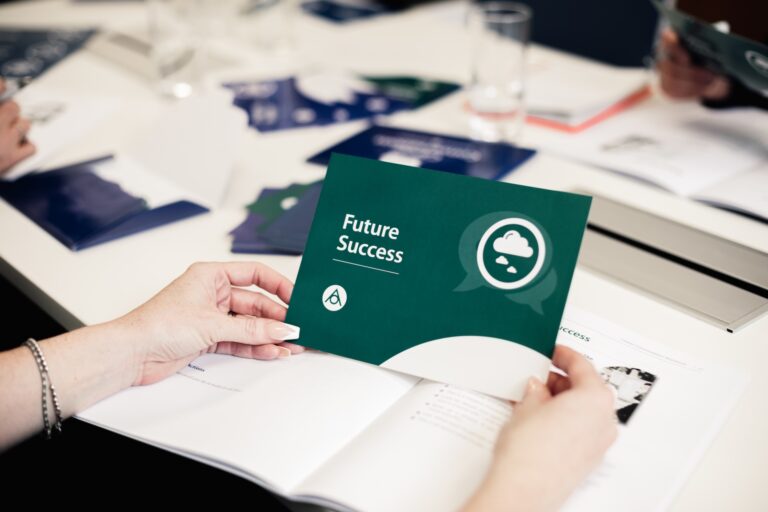A Year in the Life of a Manager Development Programme | Part Five
In this, the fifth instalment of the ‘A Year in the Life of a Manager Development Programme’ series, we explore what happened during the second workshop and look at why career conversations are important for building strong teams.
Preparation for practice
Before the session, I emailed all the managers to clarify three key points:
1 The purpose of the workshop: to equip you to help employees take ownership of their career development within the company.
2 The aim of the day: to create an enjoyable, dynamic, working environment, while at the same time giving you a practical toolkit for holding effective career conversations with employees.
3 Our focus: on practice and application, rather than on information and theory.
I also asked the managers to do some preparation work before we met for the session since I would be asking them to practice having conversations with each other about their career development, this preparation work was to reflect on the questions:
“What’s better since we last met?”
“What progress, however small, has been made since we last met?”
And I asked them to take some time to reflect on their own career journey by completing a “Your Journey So Far” activity, which was attached to the pre-workshop email they received.
Career conversations made easy
At this workshop we worked through how to have effective conversations about individual career development, using the Career Conversations toolkit. This toolkit enables both managers and employees to have effective career development conversations without worrying about damaging egos or asking difficult questions. It removes any complex paperwork or worries about following a process – and it can take less than 15 minutes.
The toolkit can be used to give to people before the career conversation takes place so that they have time to prepare and reflect on what they’d like to talk about before their meeting.
It also allows people to talk about their areas of talent, their leadership aspirations and ambitions and where they would like to take their careers, without worrying about people’s reactions to them saying what they need and want from their job.
Career ownership
There are a number of areas where employees may need support to take ownership of their careers. These include:
- Identifying where they’re ‘at.’
Thinking about how they feel about their current job and career situation can clarify matters and discharge any negative emotions, which can get in the way of positive thought – and action.
- Identifying what’s important to them in their career.
What skills do they like to use? What kind of activities do they enjoy most? What are their values in relation to work? What kind of work environment do they prefer? What kind of people do they enjoy working with?
- What does success look like for them?
What kind of activities would they be doing on a day-to-day basis? Where would they like to be working, in terms of location or geography? What kinds of responsibilities would they have? What kinds of outcomes and deliverables would they be producing? Who would they be working with and for?
- What skills and qualities do they have?
What are their strengths and weaknesses? How does the organisation view them?
- What opportunities are available to them in their current role and elsewhere in the organisation?
- How to navigate the processes and politics of the organisation.
Understanding how things are done ‘around here,’ including both processes and tactics. How to raise their profile and be more visible to key people and how to crack the system for moving job, if that’s what they want to do.
- Identifying and evaluating different options and opportunities
Looking at the pros and cons, making a decision or at least being clearer about where they want to go and the development or experience required.
- What career development strategies can they use to make progress? What actions can they take?
Some people can do this for themselves but most of us find it a lot easier to have someone else to talk to and to test our ideas on – which is why career conversations work and have such a valuable role to play.
Feedback and progress
Feedback following the Career Conversations workshop was overwhelmingly positive. When asked what they had liked and enjoyed about the workshop, the participants replied:
“The workshop took account of the fact that people are at different stages in their careers. The take away material you provided is really useful and practical and acknowledges that difference and the challenges it can present.”
“Your very practical approach – and the tools provided – enabled me to take the learning back in to the business.”
“You helped me to see the business from the employee’s perspective – and from my own!”
The workshop provided participants with a range of insights and learning points that included:
“Recognising and highlighting that career development isn’t just about moving jobs or getting a promotion, you should be looking at career development within your existing role.”
“That it’s the questions you ask that have the biggest impact on having effective career conversations.”
“The need to have these conversations frequently, and often informally to really understand what your staff are looking for in their roles.”
Actions to take
After the session, I asked the participants what key actions they were going to take as a result of attending this, the second workshop in the Manager Development Programme and what they’d suggest for improving the format in the future. Their key actions included:
“Using the material and sample questions with my team, to get them thinking about their career development before setting out their objectives for 2016 so they can be aligned where possible.”
“Developing a better structure and purpose to my career conversations.”
“Asking my team to map out their journey.”
All in all some dynamic results. And when it came to suggestions for improvements to the workshop, I’m pleased to report the following:
“Love the flow and how Antoinette gets us all to work together as a group.”
“None, just to say I’m continuing to really enjoy the sessions and thanks for all of the effort that goes into them.”
In addition to this great feedback, it transpired that by having a Career Conversation with a member of their project team, one manager had managed to retain a key member of staff by relocating them within the company, to the delight of all concerned.
Additional resources
Would you like to develop the Art of Career Conversations? No problem! I have written an eBook called It’s Good to Talk! A Practical Guide to Career Conversations in the Workplace which provide you with lots of the information you need. Just click on the link below to get a copy.



